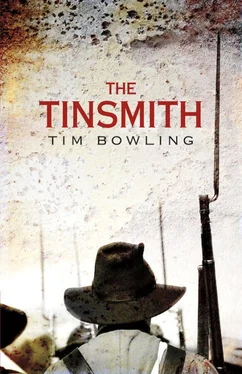There was little conversation. They each seemed locked in their own forebodings as they were locked in their own chains. The monotony of the slightly swelling fields and dark woodlots was punctuated by rare plumes of smoke from isolated houses and by the occasional small herd of cattle or sheep. The air was crisp and clean, the sky pewter with a blurred sun that gave minimal warmth. If there was birdsong, they could not hear it over the dragging of their chains and the dull hoof-clop of the trader’s horse.
The men led the way, the women trying hard to keep up. He—John they called him then, and he had never tried to separate the name from the memory—had little chance to observe Daney and her daughters, but he suspected that they maintained the pace, again out of a curious blend of gratitude and terror. Nights, they slept around large fires, fires over which McElvane parched the corn that constituted the main meal of the day. Still no one talked much, though the women tried to soothe the young boys. McElvane repeatedly stared into a small book that he drew nervously from his shirt pocket. Muttering, he’d push a stub of pencil across a page, then look up at the starless sky and shake his head. A few times he spoke to the blacks, almost as if to himself, saying that a good nigger brings both a tall price and a good home. Whip marks, he said, generally send you to the rice fields, and that’s a hard lot.
John remembered keeping silent then, like everyone else. The chains were heavy, and once he’d eaten and lain by the fire, all he wanted was for sleep to blank out the world. With the others, he remained in a state of shock. Everything had happened so quickly, from the overseer’s arrival to Caleb’s whipping to the escape attempt of Daney’s girls and finally to this drive south. Only his burning hatred for Orlett sometimes stirred him out of his numb despair and gave him thoughts of escape. He didn’t even think of a future apart from revenge, for he did not wish to escape anywhere except to the satisfaction of squeezing his hands around the overseer’s throat. Whenever the hatred abated, the letters on his cheek began to burn. He felt them even more than the iron around his neck.
Late one afternoon they crossed a wide river, the Patuxent, and it was on the other side of it that everything changed. They reached a small village, not unlike Sharpsburg, and on a dirt road before a grey-planked building with iron-barred windows joined up with a much larger coffle. Fifty or so other blacks, mostly men, boys and young women, including one who was pregnant and one carrying a baby, were similarly chained and roped. But their driver was a different sort of man. He carried a black snake whip across his shoulders and kept up a steady torrent of threats and insults. He rode up and down the line, cracking the whip and yanking back on the reins so that the horse would rear up and snort great breaths in the air between its flailing front legs. Meanwhile, his two assistants, much younger men, scruffy and sullen, rode close by, shotguns at their chests.
McElvane deferred to the new driver. From what John could gather, both men worked for a Mr. Wych, a slave dealer in South Carolina. But it was what they all learned that night—after the drive had finally stopped, exhausted, at a shabby public house that the new driver called an “ordinary”—that brought the terror back in force.
They were driven into a bare room and made to sleep on the straw-covered dirt floor, the men on one side, the women on the other. The new driver, Jensen, forbade any conversation. “I don’t want you niggers giving each other any foolish ideas,” he said and shut the door, leaving them in darkness.
Over the weeping and the praying, the grunts and sighs of bodies adjusting to the crammed space, John was surprised to hear voices almost as plain as day. Through the thin walls came McElvane’s voice imploring the new driver to leave his coffles unwhipped.
“They’re good niggers, and I especially don’t want the bright girls marked at all.”
“Yeah, I noticed them. Right pretty. Wych has told me there’s most money in the handsome ones right now. The houses in Atlanta can’t get enough.”
“It’s the talk of war does it. It makes some men mad that way.”
“Nothing mad about it,” Jensen said. “A man’s got to take his pleasure. Can’t work hard with no promise of pleasure afterwards.”
McElvane said, “I expect as much as two thousand for each and so I need their faces clear.”
“Nobody cares about the face, eh, Matt,” Jensen said and snickered. “It’s not the face that gives the pleasure. But I won’t deny that the lighter skin’s an attraction.”
The voices seemed to float around the room.
“Well, I’d appreciate it if…”
“Sure. By the way, what’s the story with the boy with the brand on his cheek?”
“He’s a good worker. A house servant, but he was hired out too. Knows some carpentry and tinsmithing. A prime boy. I expect no less than a thousand for him.”
“All right you don’t have to tell me. It don’t matter. I’ve sold Indians to free niggers before. The money’s the same colour, even if the niggers don’t have so much of it.”
“It’s a strange world, that’s so,” McElvane said.
And then came the sound of chairs scraping back. A door slammed. The voices ceased. Now the air over the blacks hung thick.
The hatred rose in his throat again and he tried to choke it down. But he couldn’t. It came out in quick, violent gasps. After a while, he curled into himself and tried to press the letters on his cheek into the dirt. But the iron collar and padlock kept his skin from the floor. Across the room, he heard crying. But something else caught his notice, something he recognized because it burned with the same intense energy that had risen up in him. And he didn’t have to see clearly to know who the energy came from. It was frightening. He lay inside it all night, waiting for it to subside so that he could sleep. But it did not subside. He rubbed the worn leather on the little pouch between his fingers, thinking that he could calm the energy that way. But it flowed on; he could not slow it. Daybreak found him trembling, his skin as cold as his chains.
Across the room in the grey air he saw Daney. She sat upright against the wall, Jancey’s head in her lap. He wanted to tell her that it was no good, there was no way she could save the girl now. She should have made the attempt when it was just McElvane. Because even if the attempt had failed, he would not have been severe in his punishment. But now, with the new driver and his assistants, escape was unlikely, and there was no telling what the punishment might be for trying. Don’t, the boy heard himself say. Just wait. Maybe I’ll be able to help. After all, Jancey means as much to me… But he did not speak. Daney’s face, fierce in the grey light, rigid as iron, had gone beyond anything he could say. She was a mother. She wouldn’t wait.
They moved on again just after first light, without breakfast. Jensen dashed along the line, cracking the whip and shouting. “Come on, you niggers.”
McElvane’s coffle set the pace because the blacks belonging to Jensen had been driven harder and treated more cruelly. John had never seen such listless people. He wondered where in Maryland they had come from. Perhaps they had been purchased farther afield and had entered Maryland simply as a way to reach South Carolina. Their clothes were little more than coarse pieces of hemp and thin cotton. Most of the men wore old scars as well as open whip marks; several had elaborate iron collars with spikes sticking out. But it was the women who lagged behind. Jensen kept riding back and threatening them that if they didn’t keep up he’d soon put a stop to their damned tricks.
Читать дальше












